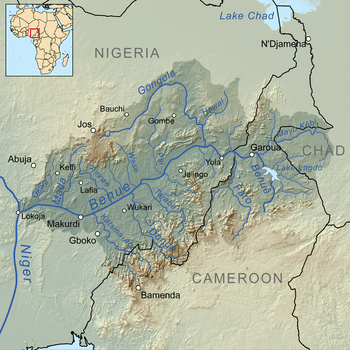Kuteb people

The Kuteb (or Kutep) people are an ethno-linguistic group in West Africa, who speak the Kuteb language. The Kuteb Language is influenced by the Hausa language. Most of the Kuteb live in Taraba State, Nigeria. Recently they have been involved in violent confrontations with other ethnic groups in which many people have been killed or forced to move.
Background
According to tradition the Kuteb migrated from Egypt about 1000 AD, eventually reaching their present location around 1510.[1] The Kuteb people are made of the following clans which is believed to be Children of Kuteb; Lumbu Ticwo Rufu Askaen Bika (Zwika) Ticwo Rubur Tswaen Acha Likam Cwumam Rucwu
Traditionally they engaged in farming, hunting and fishing in the fertile lands of the Benue River basin.[2] The people worshiped family idols, but also believed in a supreme being who created the world and brings health, rain and the harvest. They were ruled by a paramount priest king, the Kwe Kukwen, selected by a council of elders representing the different Kuteb clans.[1] A 2007 report estimated the number of Kuteb people as approximately 100,000. Most live in what is now Takum Local Government Area of Taraba State, Nigeria, although there are a few Kuteb villages in Cameroon.[2]
Under the British, who took control around 1900, the Kuteb were subject to the first-class Jukun ruler, or "Aku Uka" of the Wukari Federation.[2] In 1914, the British made the Kwe Kukwen the only graded and third class chief in the Takum part of the confederation, with the title of Kwe Takum. He was made paramount over other peoples in the area.[3] This change was resented by other ethnic groups of Hausa, Tiv, Chamba, Kukuns and Ichen, who forced the Ukwe Ahmadu Genkwe to leave Takum and reside elsewhere.[4] The last Ukwe Takum was Ali Ibrahim, ruling from 1963 to 1996.[3]
Chieftaincy stool issue
In the 1970s Takum was part of the old Benue Plateau State. The local government gazette recognized three main chieftaincy stools in the Wukari Federation for the Wukari, Donga and Takum local government areas, each to be elected by their indigenous people.[5] This law was changed by the governor Joseph Gomwalk in 1975, withdrawing the sole right of the Kuteb to select the holder of the Ukwe Chieftaincy stool of Takum from one of their two royal families. The new law allowed for election of a Chamba chief, while making a Jukun man chairman of the selection committee and altering the composition of the committee to include Jukun and Chamba as well as Hausa and Kuteb.[6] The justification was the changing demographics of Takum, but the result was disturbances that caused the government to ban the traditional annual Kuchichebe festival, when the land is blessed to ensure the next harvest will be fertile. Later, similar festivals were banned in other Wukari Federation areas due to the trouble they caused.[5]
In October 1997 the Taraba State military administrator Amen Edore Oyakhire sent a paper called Comprehensive brief on the Chieftaincy Stool of Takum Chiefdom Taraba State to the Armed Forces Ruling Council.[6] That month seven people were killed and seven houses razed in communal violence, and 31 people were arrested. Oyakhire said anyone suspected of involvement in the communal violence would be treated as detractors of the transition to civil rule.[7] In 1998 the Taraba State Government also set up a Peace Committee which managed to negotiate a truce between the ethnic groups.[8]
Ongoing conflict
The Kuteb have been involved in ongoing violent conflicts with their neighbors. An ethnic crisis between the Jukun and Kuteb broke out in 1991. On 27 December 2008 another crisis erupted in Takum over an alleged killing of a Jukun youth by Kuteb youths. Perhaps 20 people died and thousands took refuge in the local military barracks.[9] In 2000 there was fighting between the Jukun/Chamba and Tiv people, with over 250 villages burned.[10] In 2006 violent clashes again began between the Kuteb and the Tiv, in which many people lost their lives. In a December 2008 press conference the Taraba State Governor, Danbaba Suntai, said he could see no end to the conflict.[11]
References
- 1 2 William Ahmed Gangum. "he Kuteb People". Retrieved 2010-10-07.
- 1 2 3 Robert Koops (2009). A grammar of Kuteb, A language of East-Central Nigeria. Rüdiger Köppe Publishers, Köln. ISBN 978-3-89645-422-5. Retrieved 2010-10-07.
- 1 2 "Taraba: Controversy over Council of Chiefs Bill". Nigerian Compass. 2 July 2010. Retrieved 2010-10-07.
- ↑ Stephen Osu (3 April 2009). "In Taraba, Kuteb land moans suspended festival". Nigerian Compass. Retrieved 2010-10-07.
- 1 2 Theophilus Abbah (4 January 2009). "'How to Solve Jukun/Kuteb Crisis'". Daily Trust. Retrieved 2010-10-07.
- 1 2 Osu Stephen (12 January 2009). "The killing field of Takum". Compass. Retrieved 2010-10-07.
- ↑ "Seven Killed in Communal Clash in East Nigeria". Xinhua News Agency. 1 November 1997. Retrieved 2010-05-02.
- ↑ Muhammad Kabir Isa. "The State and Institutional Responses to Ethnic Conflict in Nigeria: The Case of Jukun/Chamba and Kuteb Communal Conflicts of Takum Local Government, Taraba State.". UNESCO. Retrieved 2010-05-02.
- ↑ Fidelis Mac-Leva (3 January 2009). "Jukun, Kuteb Ignite Age-Old Rivalry - Scores Killed". Daily Trust. Retrieved 2010-10-07.
- ↑ ROSE EJEMBI (4 July 2007). "Brothers at war • The unending Kuleb/Tiv tribal clash". Daily Sun. Retrieved 2010-10-07.
- ↑ "'No end in sight to Kuteb, Tiv bloodbath'". Nigerian Compass. 9 December 2008. Retrieved 2010-10-07.